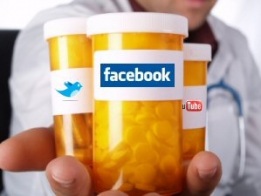Earlier this month, I spoke to the assembled incoming residents at Baylor College of Medicine about the importance of their public presence. The talk centered around a couple of core points: how to avoid some of the common mistakes that could impact their careers going forward; and how to begin to think about their digital footprint as a tool for creating professional opportunity.
Earlier this month, I spoke to the assembled incoming residents at Baylor College of Medicine about the importance of their public presence. The talk centered around a couple of core points: how to avoid some of the common mistakes that could impact their careers going forward; and how to begin to think about their digital footprint as a tool for creating professional opportunity.
While our residents will see and hear more about the importance of their public presence and networked medicine during their time at BCM, orientation is a good time to introduce big-picture concepts.
One concept I emphasized with this fresh batch of doctors: It’s no longer about you. For Baylor’s new residents and those at other medical schools, these thoughts:
This is an amazing time in medical history to be starting your career. We’ve been an analog profession for the past few hundred years. Now we’re transitioning into digital medicine and it is changing everything about what it means to be a doctor. One of the most powerful forces changing us is the way we communicate. You represent the first generation of digital natives to become doctors. You’ve grown up accustomed to the concept of real-time communication and transparency in dialogue. You’re accustomed to the newness of mobile communication.
But things became different when you were handed your diploma. And at that moment when you posted your status on Facebook, you became a public physician. The idea of being a physician in the public space carries significant responsibilities.
 As doctors, we’re different. We’re different than our friends in marketing, sales, law, finance, and just about everything else. We carry our patients’ stories and we’re entrusted with their most intimate information. How we carry ourselves and what we do with that information before our community, patients, and peers affects our ability to be effective.
As doctors, we’re different. We’re different than our friends in marketing, sales, law, finance, and just about everything else. We carry our patients’ stories and we’re entrusted with their most intimate information. How we carry ourselves and what we do with that information before our community, patients, and peers affects our ability to be effective.
There’s a core tension in play with doctors and their public role. It concerns the balance of our individual rights and the responsibility to our community. The democratization of media has given us the capacity to say and share just about everything, but there are patients and peers who count on us. Most problems with doctors and new media center on this balance. As the intentional management of your reputation becomes part of your professional strategy, this balance will hopefully become more important to you.
When you took the Hippocratic Oath, it stopped being all about you. From this point on, the concerns of your patients will always lie above your right for free expression.
For most of their lives, these new graduates have had little real accountability for their public dialogue. But with their new role, their lives are about to change. While the granular “do’s and don’ts” of Facebook represent important elements of medical education, understanding the broader element of our responsibility to the networked public needs intentional discussion.






